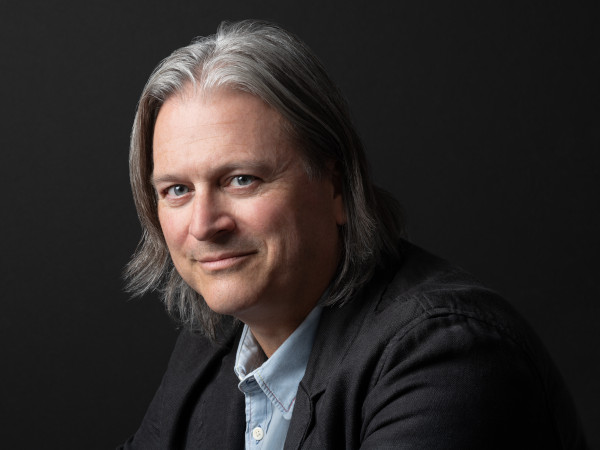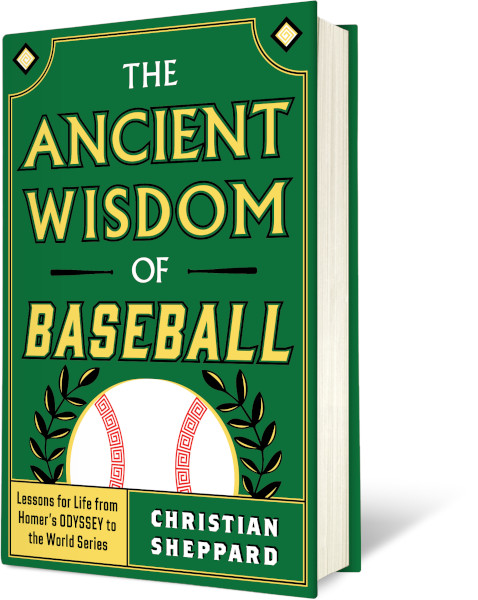
# Please introduce yourself and your book(s)!
I am the author of THE ANCIENT WISDOM OF BASEBALL: LESSONS FOR LIFE FROM HOMER’S ODYSSEY TO THE WORLD SERIES. I am professor of Liberal Arts at the School of the Art Institute of Chicago.
# What is the real-life story behind your book(s)?
My writing and thinking all come out of my life. My modus operandi is to take seemingly unlike things, for example, Homer’s ancient myths and the modern game of baseball and and ask, how do these seemingly unlike things relate to one another? Inevitably how they relate is to my own life. My hope is that my reader will also say, oh, I see, yes these unlike things also relate to me and my life in own way.
# What inspires/inspired your creativity?
What inspires my creativity are surprising things in everyday life or history or science—unlikely statistics, events, or experiences— things that make you says “What the…”?
# How do you deal with creative block?
I deal with creative block, first, by procrastinating and denying the problem, second, with self-doubt and -recrimination, and then finally out of a sense of desperation, I pick up pen and paper or open my laptop and just start to write and surprise myself that I actually have got something to say and the words to say it.
# What are the biggest mistakes you can make in a book?
The second biggest mistake you can make in writing a book is starting to write it too early before you know what you are talking about. The biggest mistake you can make is starting it too late when you don’t have anything left to discover in writing about it, when nothing you have to say really interests you any longer.
# Do you have tips on choosing titles and covers?
I like a title that draws you in and then haunts you afterward. ONE HUNDRED YEARS OF SOLITUDE is a great title. So is THE SCARLET LETTER. I like a cover that makes you want to pick the book up and, after you’ve put it down, gaze at it fondly. I love the covers for THE DANGEROUS BOOK FOR BOYS series. It was a model for my new book’s cover which doesn’t have a dusk jacket but is gold stamped directly on the casing. Very old-timey, which suits the notion of “time-less” wisdom taught both by ancient poetry and philosophy but also at the baseball game.

# How do bad reviews and negative feedback affect you and how do you deal with them?
I am grateful for any feedback for my work. I am thankful for anyone who gives my work their precious attention. But if someone is negative not about the work itself but just using my work or me as occasion to voice their own qualms about the world or just to vent, then I try not to waste any of my precious attention on them. Admittedly, sometimes you need to be stoical, like a Roman philosopher or a major league ballplayer.
# How has your creation process improved over time?
My creative process remains inconsistent but I’ve become less discontented. I have always been easily distracted. And over time I have become more clever and cunning at rationalizing my procrastination. But now I am also better at forgiving myself for procrastinating because I’ve realized that writing is less about will power and more about letting things happen, less about self-discipline and more about losing yourself in the process of discovery that is writing. When I lose myself in the work, I flow and type in a fury and actually get some good stuff down on paper, which I can edit later at my leisure. I find I can’t force flow. I need to somehow find myself in it.
# What were the best, worst and most surprising things you encountered during the entire process of completing your book(s)?
Writing a book takes a long time. Publishing, producing, promoting a book takes a lot of energy. It’s important to work on a subject that I’m really very interested in, something that rewards all the attention, time, and energy required.
# Do you tend towards personal satisfaction or aim to serve your readers? Do you balance the two and how?
I tell my students to write about what interests them because only if they write about what really interests them is there any chance that what they write will interest me. (Implicit in this suggestion is my selfish desire to remain interested, i.e., in a constant state of rapt fascination, which indeed is my desire.) I write about what interests me with the assumption that this will interest my readers. Like minds will find one another. Such writing can create between author and reader a sense of intimacy that is magical.
# What role do emotions play in creativity?
Emotions are what you’re trying to elicit, especially an emotion that manifests itself physically. If I can get an emotional response from my reader, if I can make my reader laugh out loud or wipe away a tear, well, that’s something special! And, well, you can’t get out what you don’t put in. The writer’s laboratory ought to echo with maniacal laughter as well as hysterical weeping and crazed curse-laced tirades.
# Do you have any creativity tricks?
My biggest “creativity trick” is being a big fan of work in other media. I am a prose writer. I write essays, both short and long as well as stories and novels. But I’m a huge fan of music and movies, television, theater, dance, as well as contemporary art. I think: What would this paragraph be like if it were a song by Jack White? What would this scene look like if it were filmed by the Coen Brothers? In my new book, I imagine a famous World Series game as though depicted on the bronze shield of the hero Achilles.
# What are your plans for future books?
At present I am finishing editing a historical novel about witchcraft and chariot-racing in Byzantium during the Dark Ages. It’s kind of like “Gladiator” meets “The Exorcist.” It’s set in the Hippodrome in Constantinople, one of the greatest sporting venues of the ancient world, indeed of all time. It was first inspired by a class I taught at the University of Chicago on Edward Gibbons’s THE DECLINE AND FALL OF THE ROMAN EMPIRE. I’ve since visited Istanbul a couple of times for research. The ruins of the places I write about are still there. But really my research began as a kid when my grandfather “baby sat” me by taking me with him to the horse track, a place he went everyday. The track is a pretty seedy place, a den of gamblers and grifters, but at the same time, if you’ve ever seen a stallion at full gallop across the open earth, the green grass becoming a blur, the blue sky smiling down from above, well, you know, it’s magnificent! The novel also features demons and sea-monsters, massacre and intrigue, heresy and atrocity—and it is all “true,” or at least corroborated by primary contemporary accounts as well as by archeology. And there’s a love story too!
# Tell us some quirky facts about yourself
One quirky fact about myself is that I teach a college class on the tarot. I consult the Tarot de Marseilles regularly. I think of it as a tool for self-reflection harkening back to the injunction carved above the gates to Apollo’s oracle at Delphi: “KNOW THYSELF,” the saying that inspired Socrates’s philosophical quest.
Website